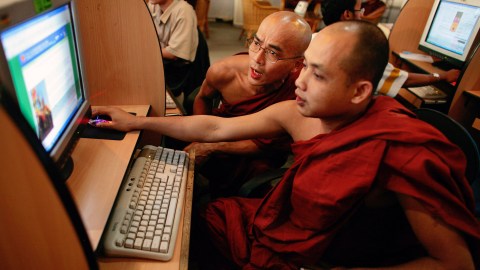Change Your Relationship with Email to Be Happier and More Productive

Making radical changes to our often hectic lifestyles is overwhelming if not implausible, but Emma Seppälä and Leo Babauta offer simple strategies for small changes in day-to-day habits that can yield big rewards with respect to sharpening attention, increasing productivity, and even becoming happier.
Emma Seppälä, Science Director of Stanford University’s Center for Compassion and Altruism Research and Education, cites a wide range of research that demonstrates how multitasking shifts our attention away from the present and tends to decrease rather than increase productivity. Being attentive to the present, she says, makes us happier and more productive with respect to whatever we are working on. In order to realize these outcomes, Seppälä recommends focusing on one task at a time and practicing meditation. These prescriptions might seem daunting to those of use deeply entrenched in our propensities for professional simultaneity
Fortunately, Leo Babauta offers several small-scale practices (on his website zen habitshere and here) that can be implemented in most daily routines to ameliorate inclinations toward multi-tasking and distractions. These are both simple and complementary to Seppälä’s findings about attention, multitasking, productivity, and happiness. For instance, Babauta offers two similar suggestions: to keep only one tab open at a time when using a web browser and to only have one app open at a time when using a cell phone. These provide simple and direct strategies for shifting away from multi-tasking toward present.
A common theme among many of Babauta’s other suggestions addresses our relationship with email. For example, he recommends having as few inboxes as reasonably possible in order to try to gather incoming messages into just one place. This simplifies the process of checking email and reduces the number of steps in checking email. Babauta also recommends checking and processing emails in a methodical way: “at regular and pre-determined intervals.” Then, when you are checking emails, you focus solely on each email. Meanwhile, Babauta recommends not checking emails while working on other tasks. Rather, he prescribes, “Shut off email, and the Internet if possible. Shut off your cell phone. Try not to answer your phone if possible. Focus on that one task, and try to get it done without worrying about other stuff.” Thus, the tendency to multi-task can be diminished both in how we engage with and limit our inboxes.
If you’re anything like me, however, the email-checking impulse is persistent. Fortunately, Babauta also provides a strategy for handling such urges skillfully. When you feel such an urge while working on a given task, he says, “[S]top yourself. Breathe deeply. Re-focus yourself. Get back to the task at hand.” By recognizing our inclinations as geared toward counterproductive distractions, then, we can use them to train ourselves to be better focused rather than see them as obstinate obstacles to our productivity and well-being. Indeed, this may well fit the bill for the kind of mindfulness practices that Seppälä encourages us to implement.
—





